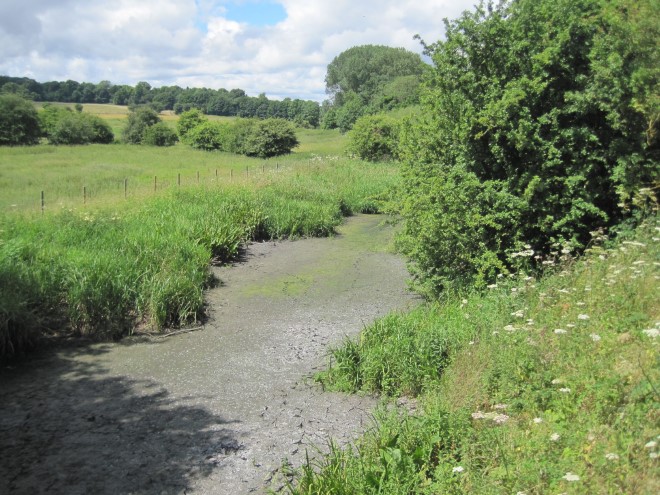Following two months of intense campaigning by the Angling Trust and other fisheries and wildlife groups on the crisis facing drought-hit rivers and chalkstreams in the South and East of England the matter was finally debated in Parliament this week.
Charles Walker MP, Chairman of the All Party Parliamentary Group on Angling, secured strong cross party support for the construction of the long overdue Abingdon Reservoir in Oxfordshire, which will enable water abstractions to be reduced on a number of Thames tributaries suffering from low flows. There was also severe criticism of the conduct of the water regulator Ofwat and their lack of concern for the environment in their decision making processes.
Last month the Angling Trust published a joint dossier – ‘Chalkstreams in Crisis’ – highlighting the impacts of three consecutive dry years on river levels and groundwater supplies and calling for the government and water companies to introduce hosepipe bans and other water restrictions immediately to avert fish kills and longer term environmental damage. The dossier included case studies from the Rivers Lea, Chess, Ver, Wandle, Hogsmill, Darent and Cray – all South East chalk rivers suffering from over abstraction and damaging low flows.
The Environment Agency’s Monthly Water Situation Reports shows the parlous state of many rivers in the region with Kent’s River Darent running at less than half of its long-term average flow. In Hertfordshire the Ver was at 45 per cent and the Upper Lea at 37 per cent.
In Cambridgeshire, the monthly mean flow on the River Cam was the lowest April flow since records began in 1949. The short periods of heavy rain have had no noticeable impact on groundwater levels with two thirds of all EA indicator sites in their July 2019 report registering chalk groundwater levels (across England) as below normal or notably low.
A combination of rising demand, increasing population and the effects of climate change have caused many of our rivers to whither and shrink, and in some cases to disappear completely for much of their natural length. The problems are particularly acute in the River Colne and Lea catchments in Hertfordshire and Buckinghamshire, where the local water company Affinity relies almost entirely on groundwater abstractions.
Referring to the situation in Hertfordshire Charles Walker said: “In the past 10 years there have been five drying events in the Upper River Chess. In the 20 years prior to that, there were three. Drier years mean more abstraction, and things are only going to get worse. Affinity Water serves the home counties north of London. Affinity has no reservoirs. It only abstracts waters from the chalk aquifers – that is the only place it can get its water from. As we know, the aquifers it abstracts from are those that feed the rivers that are currently dying. Affinity currently serves 3.6 million people. In 20 years’ time that number will be nearer to 4.5 million people. Where on earth is the water going to come from? If we go on as we are now, the water will come out of the aquifers and we will not have a single chalk stream running in Hertfordshire or Buckinghamshire. That is not an exaggeration; that is where we are at.”
Lack of water is just one of a number of problems facing the survival of England’s chalk rivers. Pollution from agriculture and sewage treatment works remain a huge threat and both were highlighted in the Commons debate.
Keen angler and Labour MP Jon Cruddas referred to looming water crisis saying: “These figures, which caught my eye – that accounting for climate change, population growth and environmental regulations, there will be a daily shortfall of some 350 million litres a day by 2045, and that will, in turn, double in the following 50 years. So this is an environmental catastrophe that is being played out day to day across the country. A failure to provide new water means that water companies extract water from our rivers, which cannot cope and subsequently die.”
On Ofwat’s response to deliberate pollutions of the River Test and other southern chalkstreams he added: “The rivers are further undermined when excess sewage is discharged into them… Time and again, the water companies have been fined, but they just take the hit..(and)..the water companies free-ride their ecological responsibilities. For example, last week it was brought to my attention.. that Ofwat has reduced the fines on Southern Water from £37.7 million to just £3 million for thousands of pollution spills, willful misreporting of data and cover-ups. How will this type of leniency and – dare I say? – criminality be changed in terms of their behaviour, which is degrading our river systems?”
Other powerful contributions to the debate were made by senior Conservative MPs Dame Cheryl Gillan, Richard Benyon and Sir Oliver Heald. In response the Water Minister Therese Coffey indicated government support for the new reservoir and new powers and environmental duties for Ofwat in the forthcoming Environment Bill.
On the Abingdon Reservoir Therese Coffey said: “I believe that Thames Water and Affinity Water, both of which are promoting the reservoir in their preferred (Water Resource Management) plans, will receive a very warm welcome when they are put forward, so that, as many others have mentioned, we can finally get on with the Abingdon reservoir, which will do a lot of good for the people of south-east England.”
The minister was challenged by Charles Walker over Ofwat who said: “The role of Ofwat has not been mentioned yet. It has no duty to have any environmental regard. Its only interest is in driving down bills, but it should take a great deal more interest in the environment. I think we have all had enough of Ofwat in this place. I hope the Minister will take that on board.”
Therese Coffey replied: “The Environment Agency challenged Ofwat in its initial 2019 price review over the fact that it and some of the companies that had come up with particular plans and made some good progress were none the less not fulling their environmental obligations. I am pleased therefore that my right hon. Friend the Secretary of State last week met the water companies and challenged them by saying that, while we recognised the strength of the investment they had brought to the water industry in the last 25 years, they must not forget the environment and we would continue to press them on that point. I am pleased that the Environment Agency is pressing the case with Ofwat so strongly. I hope that the next Government, to be formed this week, will proceed with the environment Bill, which will strengthen Ofwat’s powers. Who knows? There may be opportunities for even further consideration of a duty relating to the environment.”
Today Michael Gove, in what may be his last action as Environment Secretary, published a Summer Policy Statement on progress with the new Environment Bill. On water policy it says: “We will support regulators in ensuring that customers and the environment are protected. We will legislate to strengthen Ofwat’s powers to update water companies’ licences, in order to make sure that they can do their job.”
Commenting on the debate the former musician, Angling Trust Ambassador and river campaigner Feargal Sharkey said: “Cross party support is about as rare in modern politics as a healthy chalk stream. Yet that is exactly the welcome support our chalk streams received from MPs on Monday night, Highlighting the desperate state of our rivers members of parliament from all sides joined together to raise their voices in concern. There has been too much talk for too long, too much inaction, it is time now for government to listen, time now for government to act, time now to put the flows back into our rivers.”
Angling Trust Policy Chief Martin Salter added: “There is an undeniable water shortage crisis in the South and East of England, which is already impacting our chalk streams as well as other rivers. 85% of these globally rare habitats are located in England and our record of care is nothing short of shameful. We already have long dry sections in a majority of the chalk streams in the Chilterns and Hertfordshire and the situation is getting worse not better.
We need to reduce demand for water through compulsory metering and less leakage. We must have new reservoirs to save every spare drop in times of plenty to avoid environmental damage during drought periods. And we want to see stronger powers for the regulators, tougher action on polluters and our rivers and chalkstreams given the legal protection that there importance warrants. This week’s debate and the ministerial assurances it delivered is a small step on a very long road.”






